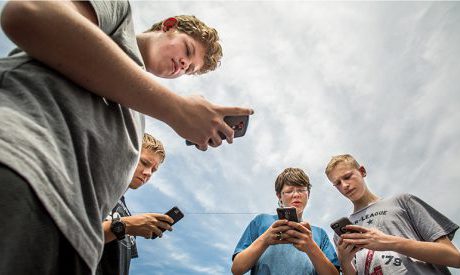Pokémon is a Nintendo franchise that launched in the 1990s. In its virtual world, “trainers” travel the world to catch varied monsters called Pokémon — rats, dragons, swordlike creatures, and more — and use these critters to fight each other.
The trainer’s goal is to “catch ’em all,” and become a Pokémon master by defeating other trainers.
What is Pokémon GO?
Pokémon GO is a free game available for download on Android and iOS devices. The goal is still for players to “catch them all.” The game uses a phone’s GPS and clock to decide which Pokémon appear in the game.
Different types appear near parks than by water. Some types only come out at night. Pokémon Go is an augmented reality game — it mixes real-world elements with the game — players have to traverse the real world to catch ’em all. The game is so popular that it has more active users than other popular apps like Snapchat, Instagram and even Twitter.
Why is it so popular?
It was just released (July 6), so it’s new and exciting. It’s also free. Pokémon has been a popular trading card and video game franchise for over 20 years — which means it has a nostalgia that appeals adults, but is still new enough to appeal to kids, teens, and young adults.
It debuts augmented reality technology in a new and exciting way. Finally, as players encounter each other out in their communities, they are meeting new people, having conversations, and building relationships.
Why should my parish care about a video game?
In the new Pokémon Go game, points, prizes and levels are gained by catching Pokémon and by going to Gyms and PokéStops — tagged locations in the real world where users can stock up on gear and points for the game. These locations — determined by GPS coordinates and Google Maps — are often found at historical landmarks, parks, and memorials. Many of those stops are also located at churches. Many parishes are reporting massive increases in foot traffic around their buildings and on their grounds.
Unlike with other video games, players encounter each other out in their communities — face-to-face. The game is fostering relationship building between parents & children, neighbors and even among strangers. Continue reading
Sources
- Department of New Evangelization, Diocese of Green Bay
- Image: OSV Newsweekly
